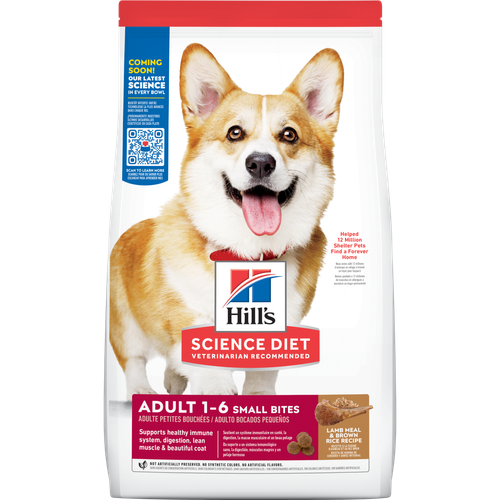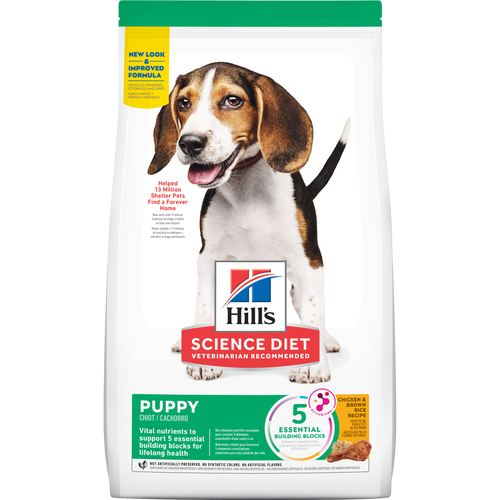
-
Find the right food for your petTake this quiz to see which food may be the best for your furry friend.Find the right food for your petTake this quiz to see which food may be the best for your furry friend.Featured products
 Adult Small Bites Lamb Meal & Brown Rice Recipe Dog Food
Adult Small Bites Lamb Meal & Brown Rice Recipe Dog FoodSupports lean muscle, for dogs who prefer smaller kibble
Shop Now Adult Small Bites Chicken & Barley Recipe Dog Food
Adult Small Bites Chicken & Barley Recipe Dog FoodSupports lean muscle for dogs who prefer smaller kibble
Shop Now Hill's Science Diet Adult Oral Care Chicken, Brown Rice & Barley Recipe Dog Food
Hill's Science Diet Adult Oral Care Chicken, Brown Rice & Barley Recipe Dog FoodClinically proven kibble technology to reduce plaque & tartar build-up
Shop NowFeatured products Hill's Science Diet Adult 7+ Healthy Cuisine Roasted Chicken & Rice Medley Cat Food
Hill's Science Diet Adult 7+ Healthy Cuisine Roasted Chicken & Rice Medley Cat FoodDelicious roasted chicken and rice in a mouthwatering sauce
Shop Now Adult Perfect Digestion Salmon, Whole Oats, and Brown Rice Recipe Dog Food
Adult Perfect Digestion Salmon, Whole Oats, and Brown Rice Recipe Dog FoodScience Diet's breakthrough nutrition supports ultimate digestive well-being & healthy microbiome
Shop Now Adult Perfect Digestion Chicken, Barley & Whole Oats Recipe Dog Food
Adult Perfect Digestion Chicken, Barley & Whole Oats Recipe Dog FoodScience Diet's breakthrough nutrition supports ultimate digestive well-being & healthy microbiome
Shop Now -
Featured articles
 The Incredible Science Behind Your Pet's Microbiome
The Incredible Science Behind Your Pet's MicrobiomeLearn what a pet's microbiome is, how it contributes to your pet's gut & overall health, and why nutrition is important in maintaining healthy microbiomes.
Read More Water
WaterDiscover why water is the most important nutrient for your dog or cat to live a healthy life. Find out how much water your pet should consume each day.
Read More Pet Food Storage Tips
Pet Food Storage TipsDiscover how and where to store your dry, as well as canned, dog and cat food. Learn how to find the "best before" dates on all Hill's pet food packaging.
Read More -


Whatever the breed, all puppies develop in the same way; they pass through the same stages from infancy to maturity. Not only is it interesting for you to know about these stages, it is also important that you should be aware of what your puppy is capable of at any particular time of his life.
Although puppies follow the same pattern of development, speeds can vary depending on the breed. Generally speaking, smaller breeds develop faster and attain maturity before they're a year old; larger-breed dogs can take as long as eighteen months to develop fully.
From Birth to Two Weeks
During these early few days, just like a new-born baby, your puppy will just sleep and suckle. But he'll be able to crawl. If he's cold he will seek the warmth of his brothers and sisters or his mother. Between 10 and 14 days, his eyes will open but his sight is weak for the first few weeks.
Week Three
Your puppy's teeth will begin to come through, and he'll learn to walk and drink. By the end of the third week, his sense of smell will develop. The breeder of your puppy should subject him to mild stress, but this isn't anything to be alarmed about. Simply picking him up and holding him in different positions is defined as mild stress. This will get your puppy used to human handling, and help him to cope later on in life.


Tasty Tips
From three to 12 weeks: Socialization
This is a critical time for your puppy. If he's to develop into a happy and healthy and well-balanced dog, he needs to experience humans, other dogs and his surroundings.
- Stage One: From three to five weeks: Your puppy will start to react to loud sounds, which is useful for mother when she growls at him to stop him feeding at will. Up to four weeks, his hearing, sight and sense of smell are working more efficiently. He'll bark, wag his tail and play-bite his brothers and sisters. He'll also begin to eat solid food and leave his sleeping area to go to the bathroom. From four to five weeks, he'll chase and play head shaking games; he'll also bare his teeth, growl, and carry things in his mouth.
- Stage Two: From five to eight weeks: Your puppy's face will become more expressive and his ears and eyes will be more coordinated. He'll join in playing games with his brothers and sisters and by the seventh week, he'll be ready to go to his new home. By the end of the eighth week, he'll be curious and willing to explore and investigate everything; but at the same time, he'll show signs of caution.
In the final week before you take your puppy home, he should be taken away from his family and he should come into plenty of contact with humans -- children as well as adults. He should also get at least five minutes attention each day.
From week six to eight, your puppy will begin to settle in with you and your family and he'll experience the sights, sounds and smells of his new home. As soon as he crosses your threshold, you should begin housetraining. - Stage Three: From eight to 12 weeks: Your new puppy will experience a very strong desire to please you as he assesses his position in a new family. You'll begin to teach him to play human games and help him to reduce his play-biting.


One of our staff authors prepared this article for you
Related products

Supports lean muscle for dogs who prefer smaller kibble

Clinically proven kibble technology to reduce plaque & tartar build-up

Vital nutrients to support 5 essential building blocks for lifelong health

Supports lean muscle, for dogs who prefer smaller kibble
Related articles

Discover how the field of dog science is giving us more and more insights into the inner workings of our furry best friends.

Your dog's coat and skin are a big part of your dog's overall health. Ensure you keep your dog's coat healthy, by following these simple tips.

Gather the following puppy supplies to prepare your family for all the fun (and commitment) that comes with being a dog parent.

Learn how to stop your dog from begging at the dinner table, and understand how it can help contribute to his health.

Put your dog on a diet without them knowing
Our low calorie formula helps you control your dog's weight. It's packed with high-quality protein for building lean muscles, and made with purposeful ingredients for a flavorful, nutritious meal. Clinically proven antioxidants, Vitamin C+E, help promote a healthy immune system.
Put your dog on a diet without them knowing
Our low calorie formula helps you control your dog's weight. It's packed with high-quality protein for building lean muscles, and made with purposeful ingredients for a flavorful, nutritious meal. Clinically proven antioxidants, Vitamin C+E, help promote a healthy immune system.

